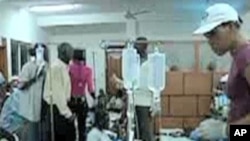The United States has responded to Haiti's request for assistance in dealing with the cholera outbreak in the Artibonite Department. On October 22, U.S. Ambassador to Haiti Kenneth Merten authorized a disaster declaration, opening the way for emergency funding to assist the Haitian government in treating and containing this outbreak.
All U.S. government agencies operating in Haiti are united in supporting the Government of Haiti and its lead agency, the Ministry of Health and will continue to coordinate closely with them, as well as with international partners such as the Pan American Health Organization and UNICEF, and the UN clusters [groups of private and public sector organizations] on Water, Sanitation, and Hygiene, and on Health.
The United States has responded to Haiti's request for assistance in dealing with the cholera outbreak in the Artibonite Department. On October 22, U.S. Ambassador to Haiti Kenneth Merten authorized a disaster declaration, opening the way for emergency funding to assist the Haitian government in treating and containing this outbreak.
All U.S. government agencies operating in Haiti are united in supporting the Government of Haiti and its lead agency, the Ministry of Health and will continue to coordinate closely with them, as well as with international partners such as the Pan American Health Organization and UNICEF, and the UN clusters [groups of private and public sector organizations] on Water, Sanitation, and Hygiene, and on Health.
U.S. assistance related to this outbreak has included the dispatch of joint Haitian-U.S. epidemiological team to Saint Marc, including employees from the Centers for Disease Control and Prevention, or CDC, to assess the situation. CDC staff is also working with our Haitian partners on laboratory diagnosis, surveillance, and treatment protocols, and they are developing tools to assess and train health care providers on the latest treatment and rehydration protocols.
In response to the Haitian government's request to establish temporary cholera treatment centers, the U.S. Agency for International Development, or USAID, has mobilized its implementing partners to distribute assets from existing stocks. These items include cots and pads, and supplies to treat and prevent the further spread of the outbreak, such as oral rehydration salts, intravenous fluids, and disinfecting and water purification solutions. An emergency stock of 60 thousand units of Lactate Ringer will be provided to treat up to 4,000 severely dehydrated patients. USAID and its partners are also working to disseminate public health information via radio, pamphlets, and mobile loudspeakers.
The disaster declaration permits USAID's Office of Foreign Disaster Assistance to rapidly procure and provide one thousand special cholera beds, as well as distribute other commodities to respond to the outbreak. The Office of Foreign Disaster Assistance has also made an initial commitment of $100,000 to provide emergency support to the Haitian Ministry of Health.
The United States has responded to Haiti's request for assistance in dealing with the cholera outbreak in the Artibonite Department.




